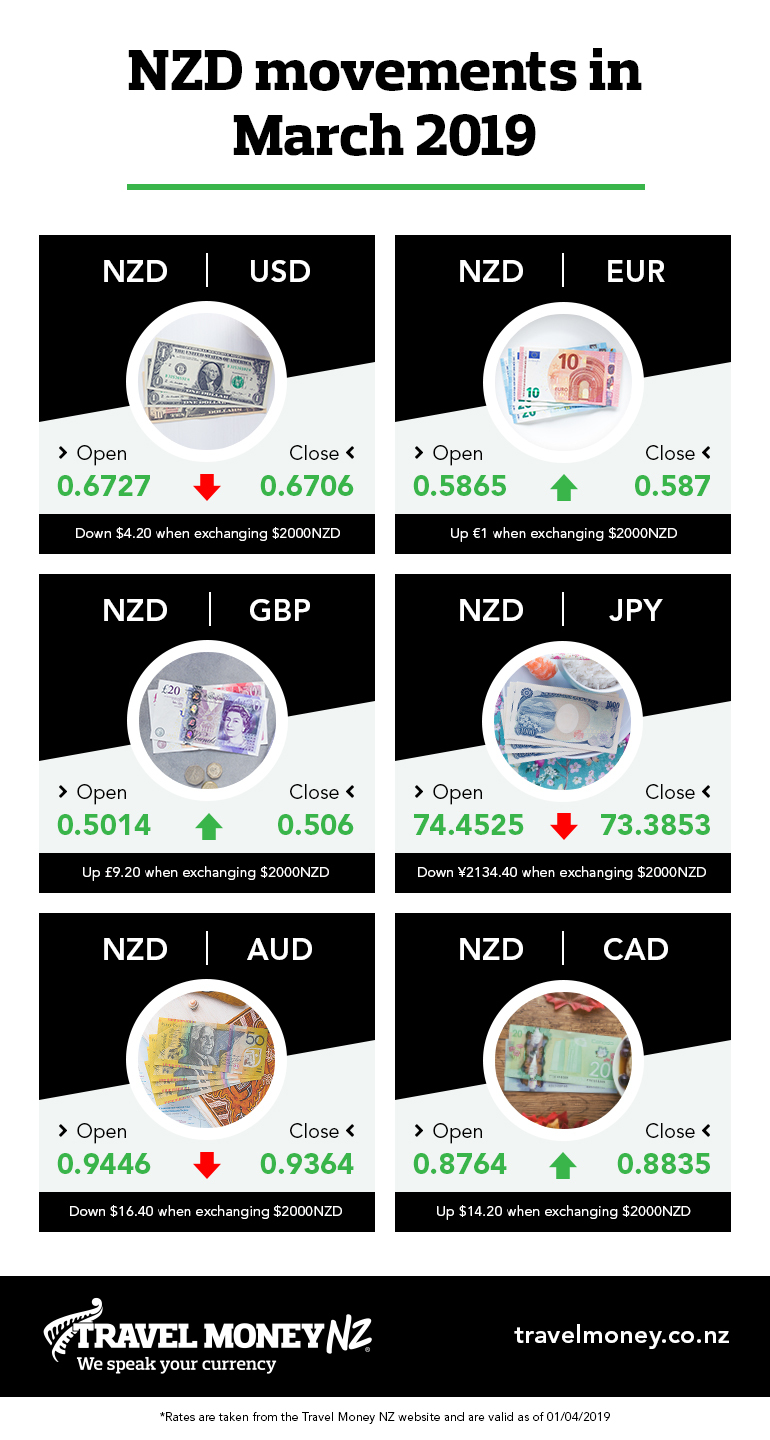Last week’s announcement from the Reserve Bank of New Zealand (RBNZ) that indicated interest rate cuts may be coming soon was not so great for the value of the Kiwi dollar. Since then, a lack of strong domestic data has failed to give the NZD a much-needed leg up. With this in mind, one NZD will buy you:
0.6637 US dollars
0.5816 euros
0.4993 Great British pound
0.8757 Canadian dollars
0.9268 Australian dollars
0.8806 Singapore dollars
Stay up to date with the latest market news, get insights and travel money tips for your next holiday and have the chance to win $500* each month by joining the Travel Money Club.
Before delving into what is affecting the NZD this week, let’s first take a look at the Kiwi dollar’s performance in March. Despite seeing a decrease in the USD, JPY and AUD, the NZD saw gains against the EUR, GBP and Canadian dollar.
What affected the NZD this week?
Lack of comparatively strong domestic data
Last week, the RBNZ indicated an interest rate cut may be on the cards. This resulted in significant downward pressure on the value of the NZD. A lack of strong domestic data out of NZ this week has seen the Kiwi dollar’s weakness continue. This became especially apparent after Australia saw some positive data released towards the end of the week. On Thursday, Australian data was released that showed a large trade surplus off the back of higher iron ore prices and a decrease in imports. Aussie retail sales data was also better than expected.
This has culminated in a weaker NZD, as the AUD is a comparatively more appealing investment.
US/China trade war progress
There are media reports that President Trump and Chinese Vice Premier Liu He will meet at 7.30am AEDT to discuss a trade deal between their two economies. Yesterday it was also reported that President Trump wants to announce the date of a summit with President Xi.
Realistically, a summit would only be announced if a trade deal had already been agreed upon. China has acknowledged the United State’s’ issues with intellectual property theft, forced technology transfer and cyber hacking; welcome news for markets, as it means they may be working towards a mutually beneficial resolution.
The NZD saw a small boost as a result of this positive news; however, it seemed to have benefitted riskier currencies, like the AUD, more than the NZD. This is particularly prevalent when comparing today’s exchange rate against the Aussie dollar to that of 12 days ago on March 25th. If you were exchanging $2000NZD, you would have taken $44.40AUD more in March 25th then if you were transferring today. That is a ticket to a footy game or a meal for two at the pub. If you need to purchase AUD, we recommend adding Rate Guard to your transaction in store. That way, if the rate improves within 14 days of purchase, we can refund you the difference and get you that extra steak at the pub.
US domestic data
Today will also see the release of the US Non-Farm Payrolls (NFP) data. This data accounts for employment in goods, construction and manufacturing companies, excluding (as the name would suggest) farm workers, private household employees and non-profit organisation employees. The market is tipping an increase of 177 thousand jobs, with the unemployment rate remaining steady at 3.8%. Increasing jobs is a good proxy for underlying economic growth; however, said growth is also dependent on average household earnings.
When considering the current market sentiment, today's NFP could be quite influential on the value of the USD. Should it be positive, the upward pressure on the USD could result in an adverse effect on the value on the NZD.
Brexit
There hasn’t been a great deal of progress since this time last week. As it stands the UK has a week to sort themselves out; otherwise they will crash out of the EU with no deal next Friday the 12th of April.
Prime Minister Theresa May is currently seeking a further extension to the Brexit date from the EU. British MPs voted in 313 to 312 in favour of this extension. Ironic that they keep voting for extensions instead of making the most of the extra time they have been given to find a suitable withdrawal agreement.
Whether or not the United Kingdom is granted an extension is dependant on Prime Minister May delivering a credible and realistic way forward.
Despite the lack of progress, investors seem to be sitting tight when it comes to the NZD/GBP currency cross. The current weakness in the NZD appears to be outweighing the uncertainty facing the UK right now. The NZD/GBP cross is quite volatile, as you can see from the currency chart below.












